Development of the Memorial Forum Project
The Memorial Forum Project goes back to an idea of a group of women Anfal survivors in Rizgary in 2008. At the time,
they were disappointed about the construction of an Anfal memorial statue by the Kurdistan Regional Government without
consulting the survivors' community. In the same year two women Anfal surivors visited Germany and participated in a
remembrance ceremony at the memorial site of the former Nazi concentration camp for women in Ravensbrück near Berlin.
After their return the women founded a committee for a women's memorial forum in Rizgary. The German NGO HAUKARI
accompanied the process with funds from the German Foreign Office.
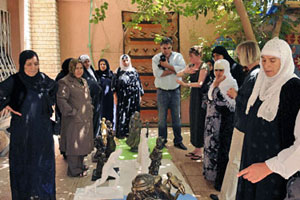 Women Anfal survivors
discuss models for the woman statue
Ever since more than one hundred women Anfal survivors engage in the project activities.
They meet regularly, exchange their memories and strengthen their self-help-structures.
Women Anfal survivors
discuss models for the woman statue
Ever since more than one hundred women Anfal survivors engage in the project activities.
They meet regularly, exchange their memories and strengthen their self-help-structures.
They discuss with local artists, architects and German consultants and bring their memories into ideas for the design of the
memorial forum.
They lobby at political and civil society organizations for support and negotiate with the Kurdistan Regional
Government on the implementation of the memorial forum.
They have gained broad consent to the project among Anfal survivors - women, men and the second generation of survivors.
Indeed though the memorial forum is a women's initiative and will represent the specific experience of women survivors,
the activities planned in the memorial forum address the entire Anfal survivors' community.
In public exhibitions and meetings the women have elicited broad support for the project - from women and men throughout the
Kurdish region - and brought their situation and claims into the public debate.
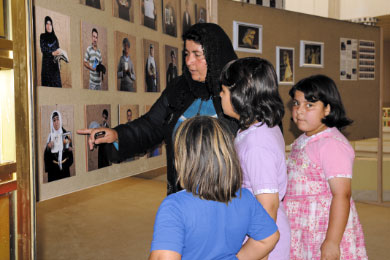 Exhibition in Rizgary 2011
Exhibition in Rizgary 2011
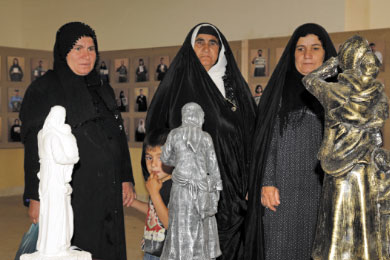 Exhibition Rizgary 2011 - women Anfal survivors discuss models for woman statue
Exhibition Rizgary 2011 - women Anfal survivors discuss models for woman statue
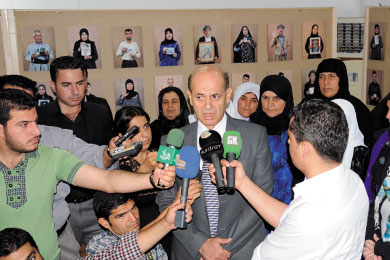 Exhibition Erbil 2011; the Minister of Martyr and Anfal Affairs opens the exhibition
Exhibition Erbil 2011; the Minister of Martyr and Anfal Affairs opens the exhibition
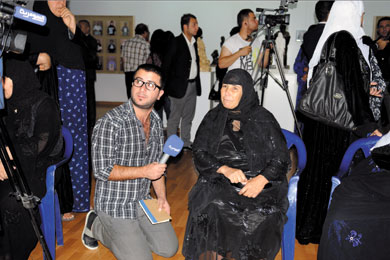 Exhibition in Erbil 2011; Anfal survivor with journalist
Exhibition in Erbil 2011; Anfal survivor with journalist
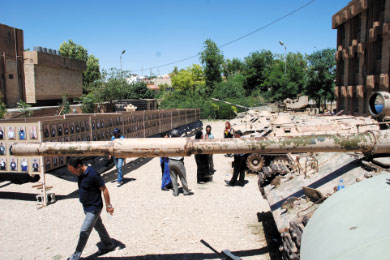 Exhibition at the former Baath-regime's security building in Sulaimania , Juni 2012
Exhibition at the former Baath-regime's security building in Sulaimania , Juni 2012
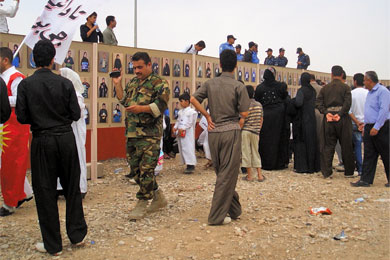 Exhibition at the Anfal remembrance ceremony in Rizgary, April 2012
Exhibition at the Anfal remembrance ceremony in Rizgary, April 2012
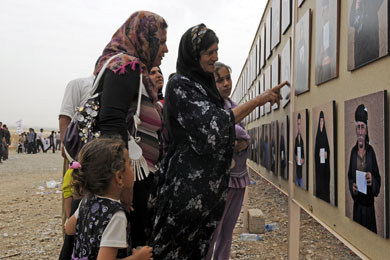 Exhibition at the Anfal remembrance ceremony in Rizgary, April 2012
Exhibition at the Anfal remembrance ceremony in Rizgary, April 2012
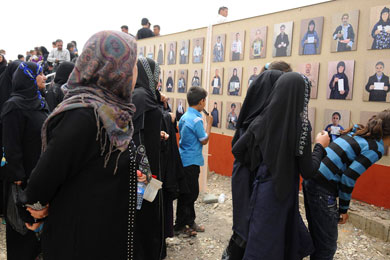 Exhibition at the Anfal remembrance ceremony in Rizgary, April 2012
Exhibition at the Anfal remembrance ceremony in Rizgary, April 2012
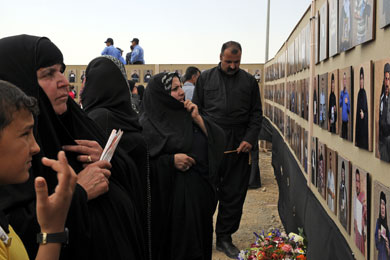 Exhibition at the Anfal remembrance ceremony in Rizgary, April 2012
Exhibition at the Anfal remembrance ceremony in Rizgary, April 2012
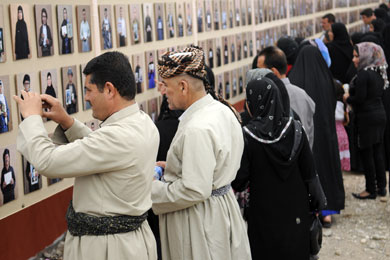 Exhibition at the Anfal remembrance ceremony in Rizgary, April 2012
Exhibition at the Anfal remembrance ceremony in Rizgary, April 2012
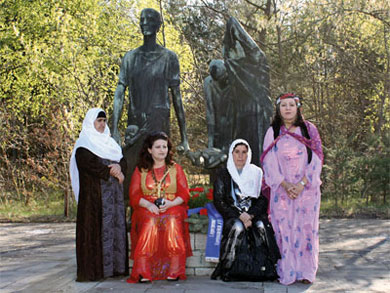 Delegation of women Anfal survivors at the memorial site of the former Nazi concentration camp for women in Ravensbrück
On several occasions, women Anfal survivors, artists, and other project supporters have travelled
to Germany, participated in workshops and conferences, visited memorial sites for the victims of the Holocaust and discussed
with German artists and memory projects. Close contacts developed especially with the memorial site at the former Nazi
concentration camp for women in Ravensbrück and the House of the Wannsee Conference in Potsdam. In conferences and workshops
in Germany women Anfal survivors began also an exchange with Rwandan and Bosnian women survivors of violence.
Delegation of women Anfal survivors at the memorial site of the former Nazi concentration camp for women in Ravensbrück
On several occasions, women Anfal survivors, artists, and other project supporters have travelled
to Germany, participated in workshops and conferences, visited memorial sites for the victims of the Holocaust and discussed
with German artists and memory projects. Close contacts developed especially with the memorial site at the former Nazi
concentration camp for women in Ravensbrück and the House of the Wannsee Conference in Potsdam. In conferences and workshops
in Germany women Anfal survivors began also an exchange with Rwandan and Bosnian women survivors of violence.
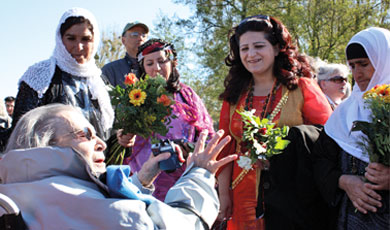 Delegation of women Anfal survivors at the memorial site of the former Nazi concentration camp for women in Ravensbrück (with Simone Gaurnay, Vice President of the International Committee of former Ravensbrück prisoners)
Delegation of women Anfal survivors at the memorial site of the former Nazi concentration camp for women in Ravensbrück (with Simone Gaurnay, Vice President of the International Committee of former Ravensbrück prisoners)
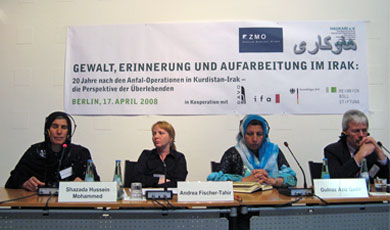 Women Anfal survivors at Conference in Berlin
Women Anfal survivors at Conference in Berlin
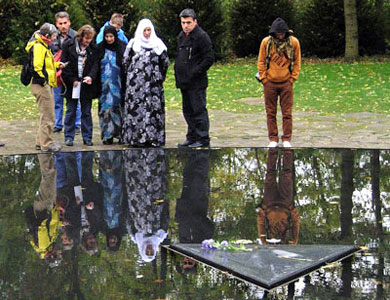 Women Anfal survivors at the memorial for the Sinti and Roma murdered by the German Nazi regime, Berlin, October 2012
Women Anfal survivors at the memorial for the Sinti and Roma murdered by the German Nazi regime, Berlin, October 2012
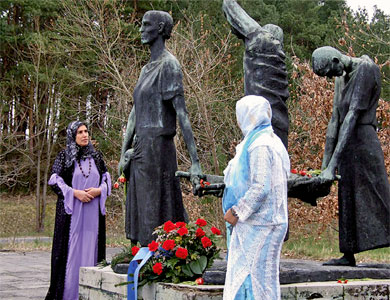 Delegation of women Anfal survivors at the memorial site of the former Nazi concentration camp for women in Ravensbrück, April 2009
Delegation of women Anfal survivors at the memorial site of the former Nazi concentration camp for women in Ravensbrück, April 2009
Under the auspices of the Anfal Memory Forum initiative, women Anfal survivors are joining together to collectively
transform their memories of violence and loss into proposals for the memorial's design. Alongside this psychosocial
aspect, they transcend their role as waiting and mourning women by entering into dialogue with other social groups,
and engaging in the public debate over the memorialization of Anfal. By doing so - by deploying their own images,
narratives, strengths, and resources - they challenge the dominant national Kurdish discourse about Anfal, which
largely depicts them as passive victims.
The project combines psychosocial support with the political empowerment of women Anfal survivors, creating a forum for
exchanges between Anfal survivors in Kurdistan-Iraq and other groups of victims and survivors throughout Iraq.
This will contribute to a far-reaching debate about how best to deal with the Iraqi past, with the vital participation
of survivors of violence.
Implementation
From the very beginning of the project women Anfal survivors have lobbied at the Ministry of Martyrs and Anfal Affairs
of the Kurdistan Regional Government for funding and constructing the memorial site building. Initially they met
skepticisms as the "memorial from below" contrasts with the government's idea of monumental memorial sites that represent
the dimension of the Kurdish national tragedy. Meanwhile the municipality of Rizgary has allocated a central construction
ground to the memorial, situated opposite to the cemetery, where some four-hundred Anfal victims have already been reburied.
The Ministry of Anfal and Martyrs Affairs has released the budget for the construction of the memorial building.
The construction works are expected to be started in autumn 2014.
HAUKARI e.V. will continue to support the project with funds from the German Foreign Office and assist women Anfal survivors
in close cooperation with German memorial projects in developing concept for exhibitions in the memorial forum and for
the use of the forum as a social space and dialogue forum.